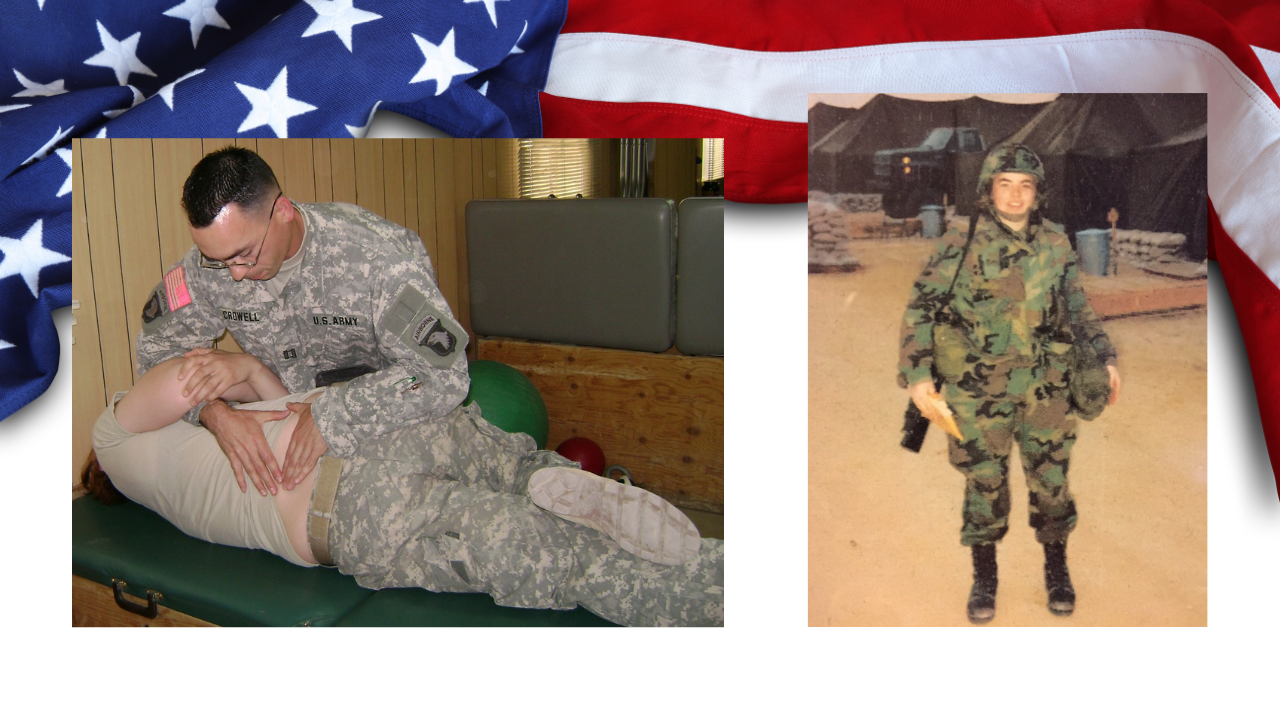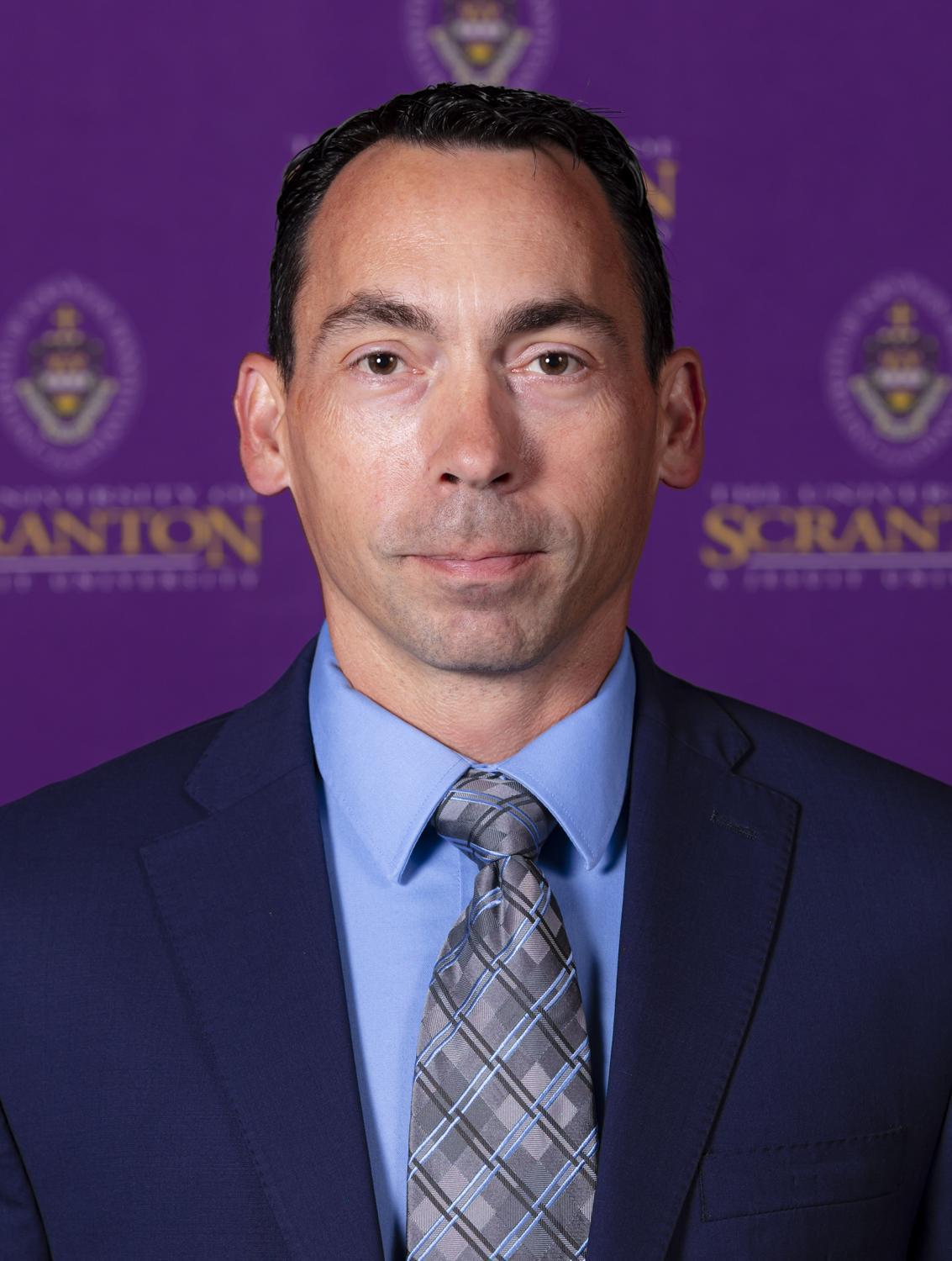University Educators Advocate for Veterans

By Shannon Bunn, student correspondent
Two members of The University of Scranton faculty in the Panuska College of Professional Studies, Michael Crowell, PT, DSc and Mary L. (Doyle) Troy, Ph.D., NCC, LPC ’95 G’20 advocate for veterans through their academic research and classroom education.
"I think we owe it to our veterans to make sure they have the tools to live a healthy life. I’ve been involved with a veteran’s organization called Team RWB, whose mission is to enrich veterans' lives through physical fitness activities. This is something that I strongly believe in – the benefit of exercise, not just for physical health, but for mental health as well," said Dr. Crowell, an associate professor in the Department of Physical Therapy who teaches courses in Orthopedic Physical Therapy and Scientific Inquiry.
"In addition to my work as a clinician, educator and researcher, I was also involved in a health and wellness initiative at the Army Surgeon General’s Office that sought to utilize these same principles in active duty Army Soldiers."
Dr. Troy, assistant professor in the Department of Counseling & Human Services Courses developed the course, Counseling with Veterans and Military.
"Professionally, I teach my students about the culture and needs of veterans. Personally, I am active in lobbying my government representatives for the needs of service members and veterans."
She has also presented on veterans' issues during a Scranton Faculty Workshop Series.
"One of the key takeaways that I shared was how important it is for faculty to understand the different needs of veteran students (as compared to traditional students), as well as ways to help veteran students achieve success here at Scranton."
Drs. Crowell and Troy talk with Royal News about their military service, their academic research and presentations and what inspired them to their roles as educators.
A Word with Michael Crowell, PT, DSc

Q. What inspired you to pursue a career as an Orthopedic & Sports Physical Therapist after your time as a Field Artillery Officer with the U.S. Army?
"I have been an athlete for most of my life, playing lacrosse at West Point and continuing to compete in 5Ks and bike races after college. While I was interested in sports medicine and physical therapy during high school, an ACL injury at West Point solidified my interest. After four years as a Field Artillery officer stationed in Germany, I was lucky to be accepted to the Army-Baylor Doctoral Physical Therapy Program."
Q. You spent nearly two decades dedicated to this medical discipline within the U.S. Army everywhere from Baghdad, Iraq to West Point, New York. What brought you the most fulfillment in this role?
"The best parts of being a PT were in seeing the results of individual patients that I’ve treated and seeing the professional growth of sports PT fellows that I taught and mentored."
Q. What motivated you to become an educator in this field of study?
"Most of my greatest mentors were educators in some way. That is really a hallmark of medical professions; passing on your knowledge and expertise. I really see this as a way to make your impact greater than anything you could have with just your own patients."
Q: I've read that some of your some of your recent published research is related to veterans' issues and treatments, such as "The Effectiveness of Battlefield Acupuncture in Addition to Standard Physical Therapy Treatment after Shoulder Surgery: A Protocol for a Randomized Clinical Trial," among other studies. What interested you most about these studies? How do you feel that your time spent in service to your country helped you facilitate the research?
"I think research on topics important to these populations, such as pain management, is extremely important to help them perform at their best. My research focus has always been on topics that allow Soldiers and Cadets to return to their military duties as quickly as possible, but at the same time safely. I am particularly interested in these topics because I have seen many Soldiers return to duty before they are ready, often resulting in subsequent injuries."
Q. What do you feel is your greatest accomplishment in your career?
"I think my greatest accomplishment was my time as the Fellowship Director for the West Point Sports Physical Therapy Fellowship. During my four years as the Director, there were 11 program graduates who are now providing leadership and mentorship to physical therapists throughout the Army. The program was awarded $976K in grant funds, published 14 papers in peer-reviewed journals and presented over 20 abstracts at national conferences."
Q. What specific talents do you bring to the Panuska College of Professional Studies?
"I think the main thing I bring to PCPS is my expertise in orthopedics and sports physical therapy. I’ve spent the last 10 years working in the West Point Sports PT Fellowship, which is a great position to continue to build skill and expertise. A unique element that I bring is leadership. I’ve led a 30+ person field artillery platoon as a young 2nd Lieutenant, served as a personnel officer for a 450+ person field artillery battalion, and have been in charge of physical therapy clinics ranging from 4 to 20+ people."
A Word with Mary L. (Doyle) Troy, Ph.D., NCC, LPC ’95 G’20

Q: Your time as a member of U.S. Naval Security Force during Operation Desert Storm U.S. Naval Reserves included work at a Fleet Hospital in Saudi Arabia during Operation Desert Storm. Thank you for your service. What stands out in your mind from that time? How did it motivate you to pursue a career as an educator?
"Looking back, what stands out is the change of the public’s perception of the military. Due to the unpopularity of the Vietnam War, the public perception of the military (and service members) was quite poor. There was little respect for those who served in the military (apart from WWII veterans). Operation Desert Storm (the First Gulf War) helped changed that negative perception. The civilian population begin to understand you could protest military actions yet still support military service members. I believe this shift in public perception (and the support it has generated for service members and veterans) has helped greatly with service members’ and veterans’ mental health.
As an educator, I firmly believe that giving back and helping others is a vital part of my job. Serving in the military was a part of this foundational belief. My service in the military was a way to give back to a country where I have been given many opportunities. It was also a way to help protect and defend not only family and friends, but fellow citizens. As an educator, I now use my talents and voice to help protect and defend – by teaching students the skills they need to help others as well as using my voice to advocate for those marginalized in today’s world."
What inspired you to develop the course Counseling with Veterans and Military? What seems to resonate the most with students taking the course?
"The military is its own culture, with unique customs, traditions, ways of speaking and expectations. It is vital to understand this culture if you want to work with veterans. As a veteran and a counselor, I am privy to many of the unique mental health needs of today’s veterans. I was inspired to develop the Counseling With Veterans and Military course because of the great need for mental health services within the veteran population.
In a successful counseling therapeutic relationship, a key component is developing rapport. If the client doesn’t feel that the counselor understands them or their experiences, it is difficult to establish that rapport. This can often result in the client discontinuing counseling and therefore not receiving the help they need. My goal in developing the veterans course was to equip students with the background and knowledge to understand military culture and the unique mental health needs of those who have served, thereby expanding the number of counselors available to work with our veteran population."
Q: You earned your undergraduate and Master’s degrees from The University of Scranton. What brought you back to the University as an educator?
"The University of Scranton is a special place. Since I stepped foot on campus as an undergraduate, I have felt at home. Part of the reason I feel at home is the supportive community we have here. My undergrad and grad professors were a large part of that supportive community while I was a student. My hope is that I am now a support for my students."
Q. Your current role at The University of Scranton is assistant professor with the Department of Counseling and Human Services and prior to that you were an adjunct professor for over 18 years. How do you feel your work aligns with the University’s Jesuit mission?
"I often say my discipline (counseling) and the Jesuit mission of cura personalis (care for the whole person) go hand-in-hand, and so it is easy to align my work with Ignatian ideals. However, it goes deeper than that. As you walk around campus, you will notice almost every building has “AMDG” inscribed somewhere. This stands for “Ad maiorem Dei gloriam”, the Jesuit motto that means “For the greater glory of God”.
St. Ignatius states that everything we do should be for the greater glory of God. I feel I have been called to do this and am blessed that I get to work towards this goal in two ways with my career. As a counselor, I have the honor of walking alongside my clients as they work to overcome challenges and obstacles, heal from pain, and become the person they want to be. As a counselor educator in the Department of Counseling and Human Services, I have the privilege of helping my students learn and master the skills they need to help others, as well as understand the dignity and worth of all human beings."
Q: You’ve presented internationally on “The psychological impact of parental PTSD on children of military veterans,” among other topics related to veterans’ issues. Please share a bit about your research. What was a specific instance that you realized your work was making an impact?
"When working with veterans, it’s important to understand that their mental health doesn’t only affect them, it affects their whole family. My research looked at how a (veteran) parent’s PTSD affects the mental health of children. Children’s mental health needs can often get overlooked, especially when a parent is in crisis. My presentation was focused on what types of mental health issues present in children when a parent has PTSD, as well as tools and techniques to help children manage these issues in healthy, positive ways.
Counseling is a field where it can take years to know the impact of your work. I think knowing spreading awareness for a population that was often overlooked is the first step in impacting positive change."
Q: What do you view as one of the greatest accomplishments in your career?
"My greatest accomplishments have come when a student reaches out to say they felt supported by me or that my classroom or office felt like a safe space where they could be their authentic selves. Sounds mushy, but it is the truth. 😊"






